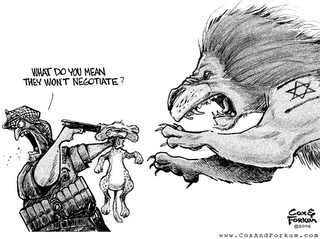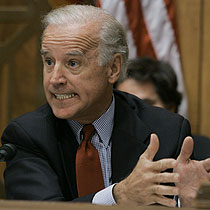
By: Efraim Karsh, Special To The Evening Bulletin
06/30/2006
At a time when more than half of the American public believes the Iraq war has not made the United States safer, and nearly two-thirds says it is not worth fighting anymore, one needs a good deal of intellectual courage to describe the war as "noble." But then, Fouad Ajami, a professor of Middle East studies at Johns Hopkins University, has never shied away from speaking his mind, even if it meant digressing from the received wisdom. He did so for the first time some 25 years ago in "The Arab Predicament," a scathing indictment of pan-Arabism, and has been challenging the cliches of Middle East scholarship ever since.Now Mr. Ajami takes on the latest controversy surrounding America's policy in the Middle East, and, true to form, he does so with customary erudition and verve. The Foreigner's Gift: The Americans, the Arabs, and the Iraqis in Iraq (Free Press, 378 pages, $26) offers a beautifully written account, based on six trips he made to Iraq in the aftermath of the defeat of Saddam Hussein's regime, of the alternating moods, hopes, fears, and disillusionments among Iraqis, and Arabs more generally, since this momentous event.As is vividly illustrated by the book's title,Mr. Ajami makes no bones as to where his sympathies lie. By deposing a bloodthirsty tyrant and enabling his brutalized subjects to put him on trial, he argues, the United States has established, for the first time in modern Arab history, "the precedent of holding a ruler responsible for the follies and crimes of his regime," without which there can be no civil society. This, together with the liberation of Iraq's long-oppressed Shiite and Kurdish communities to play their overdue roles in their country's future, has sown the seeds of Iraq's potential transition, if not that of the wider Middle East, to a freer and more and accountable political system.Mr. Ajami is by no means oblivious to the immensity of the task undertaken by the United States, nor does he preclude the possibility of a colossal failure. On the contrary, as a longtime critic of pan-Arabism, he is keenly aware of the malignant hypocrisies that continue to mar Arab politics to the present day, not least the total indifference of the Arab regimes to the fate of ordinary Iraqis, their tacit endorsement of Islamist terrorism so long as it is not directed against themselves, and their readiness to espouse virulent anti-Americanism despite a heavy reliance on U.S. political, military, and financial support. He is particularly scathing of President Mubarak of Egypt, who "took America's coin but ran afoul of America's purposes," and Jordan's King Abdullah II, a quintessential product of the "elite American prep schools and the ways of modernity" who "opened the door to bigotry, lent it his authority." He is similarly contemptuous of the hypocrisy of Sheik Yusuf al-Qaradawi, a spiritual guide of the Muslim Brothers and one of today's most influential Islamic thinkers, who in the summer of 2004 stipulated that the killing of American civilians in Iraq was "obligatory on all Muslims," even as he was living "in the safety in Qatar - among Americans of every profession present in that principality." And when terror came to Qatar the following year - in the form of a car bomb attack on a British theater group performing in the emirate - Qaradawi minced no words in condemning "such criminal deeds."If, today, America is reviled in the Arab and Muslim worlds, it is not because of "the culture of terrorism that had put down roots in the Arab world," let alone its specific policies, but because, as the pre-eminent world power, it blocks the final realization of this same age-old dream of regaining "the great tolerant civilization of the early caliphate." That this is not a vision confined to a tiny extremist fringe was evidenced by the overwhelming support for the September 11 attacks throughout the Islamic world, well beyond the confines of the Middle East, in the admiring evocations of Mr. bin Laden's murderous acts during the crisis over the Danish cartoons, and in the significant reservoirs of sympathy, shown in recent polls, among Muslims in Britain for the "feelings and motives" of the suicide bombers who attacked London last July.In the historical imagination of many Muslims and Arabs, Mr. bin Laden represents nothing short of the new incarnation of Saladin, defeater of the Crusaders and conqueror of Jerusalem. In this sense, the house of Islam's war for world mastery is a traditional, indeed venerable, quest that is far from over. To the contrary, now that this war has met with a determined counterattack by the United States and others, and with a Western intervention in the heart of the House of Islam, it remains to be seen whether this "noble" endeavor, to use Mr. Ajami's words, "would prove to be a noble success or a noble failure."The New York Sun










